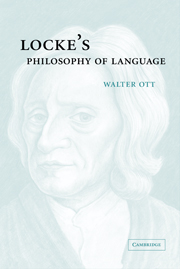Book contents
- Frontmatter
- Contents
- Acknowledgements
- Note on textual references
- Introduction
- 1 Signs and signification
- 2 Particles and propositions
- 3 Essence and abstraction
- 4 Locke contra the Aristotelians: signification and definition
- 5 Beyond the bounds of sense?
- 6 The reception of Locke's philosophy of language
- 7 Conclusion
- Bibliography
- Index
Introduction
Published online by Cambridge University Press: 22 September 2009
- Frontmatter
- Contents
- Acknowledgements
- Note on textual references
- Introduction
- 1 Signs and signification
- 2 Particles and propositions
- 3 Essence and abstraction
- 4 Locke contra the Aristotelians: signification and definition
- 5 Beyond the bounds of sense?
- 6 The reception of Locke's philosophy of language
- 7 Conclusion
- Bibliography
- Index
Summary
I must confess then, that when I first began this Discourse of the Understanding, and a good while after, I had not the least Thought, that any Consideration of Words was at all necessary to it. But when having passed over the Original and Composition of our Ideas, I began to examine the Extent and Certainty of our Knowledge, I found it had so near a connexion with Words, that unless their force and manner of Signification were first well observed, there could be very little said clearly and pertinently concerning Knowledge …
(III.ix.21: 488)Despite the importance Locke attaches to issues of language, this aspect of his philosophy has drawn comparatively little attention in the secondary literature. One reason for this neglect might be the disfavor into which what is commonly understood as his view has fallen. Locke is regarded as a “mentalist” who has been refuted by the arguments of Frege, Wittgenstein, Putnam, and their followers. Haven't we learned that meanings aren't in the head? Why bother with Locke at all?
One justification historians of philosophy are apt to give in such contexts is that the view in question has simply been the victim of uncharitable interpretation. This has certainly been the case with Locke's philosophy of language, from his day down to our own. Locke is not vulnerable to the standard arguments deployed against him, and his main rival, the causal theory of reference, is simply false (or so I shall argue).
- Type
- Chapter
- Information
- Locke's Philosophy of Language , pp. 1 - 6Publisher: Cambridge University PressPrint publication year: 2003



